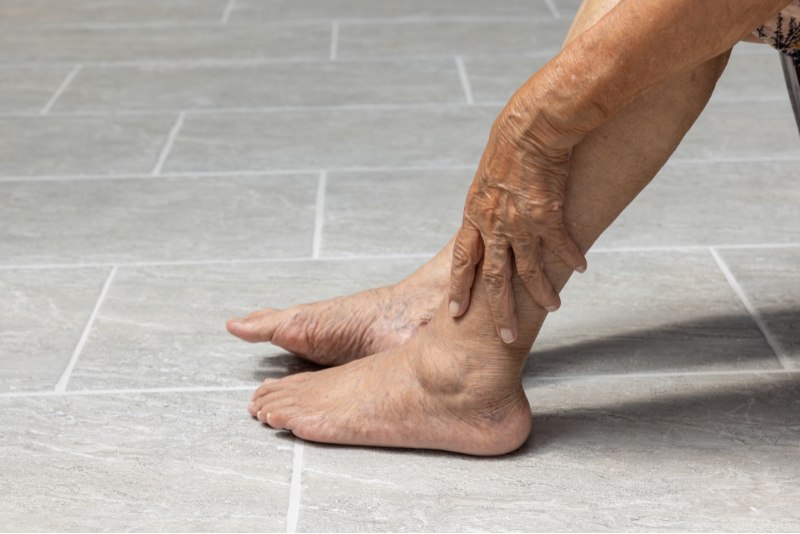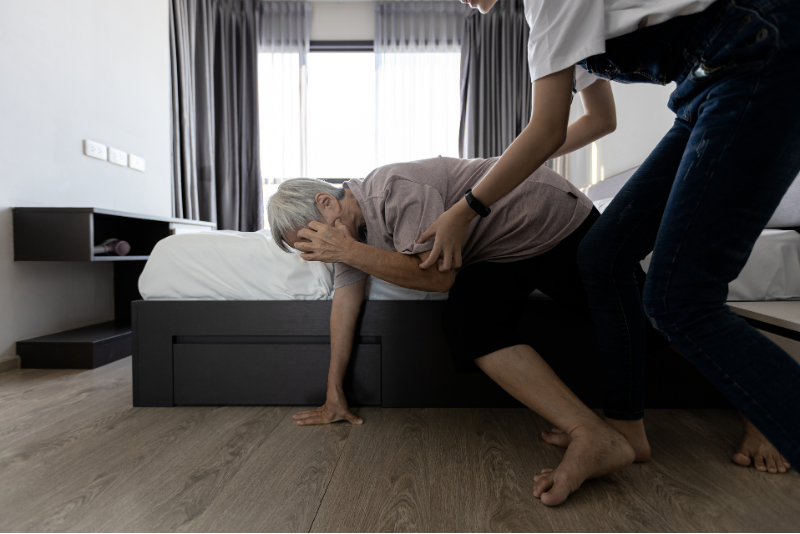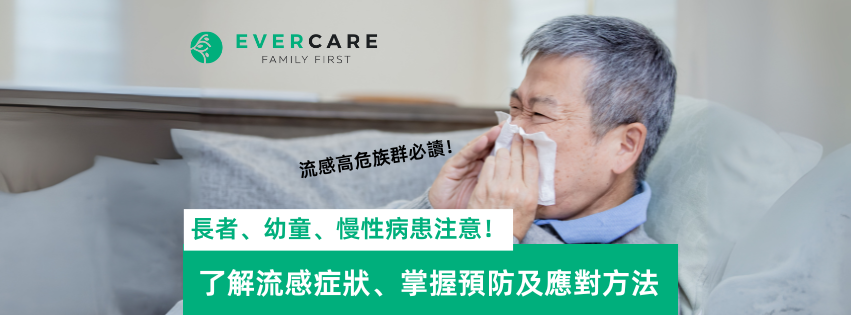The risk of falling increases with age - in Hong Kong 75% of elderly who have experienced falls have sustained injuries, of which 7% were serious injuries. Apart from physical consequences, falls also put a major psychological and financial burden on you and your loved ones. For example, 70% of fallers reported having a fear of falling after such incidents.
Falls happen with a reason, and understanding which risk factors apply to your loved ones can reduce injuries and protect their sense of independence.

1. Poor EYESIGHT & HEARING
- Patients with glaucoma are at 3-4x greater risk of falling - putting them at a greater risk than those with cataract or diabetes.
- Vision problems and hearing loss can affect depth perception and spatial awareness, causing the elderly to misjudge obstacles and feel confused.
- If you find that your loved one has difficulty recognizing faces or objects, consider using corrective devices or visual cues in your home to provide them with a greater sense of security.
Another major factor that increases the risk of falling are environmental hazards. Check out our article on
creating a fall-free home environment
to learn how to reduce fall hazards and make your home more accessible.
are your parents taking multiple medications?
Early prevention is the key to reducing falls. Our professional physiotherapists and occupational therapists can provide fall-risk assessments and strength training within the comforts of your home. Learn how our
fall prevention program
can help your loved ones avoid the serious consequences of falling.
2. MUSCLE WEAKNESS & DECREASED BALANCE
- Aging causes a natural decline in muscle mass and strength, which makes it harder for the elderly to balance and stay steady on their feet.
- Experiencing difficulty when getting up from a seated position or feeling weak in the legs can be an indication of poor nutrition and bone health (e.g lack of calcium and vitamin D).
- Consulting with a
dietitian
can help you understand nutritional deficiencies and stick to a meal plan that enhances muscle mass and cognitive health.
3. CHRONIC HEALTH CONDITIONS
Those with a history of chronic conditions, such as diabetes or depression, have an even
higher risk of recurrent falling*. Symptoms like frequent urination and forgetfulness can make it difficult for elderlies to navigate their surroundings safely and independently.
List of Services
-
OsteoporosisList Item 1
- Increased risk of hip fractures due to weakened bones
-
Parkinson's disease
- Impacts balance, coordination, and motor control
- Muscle stiffness can cause an increased risk of tripping
-
Dementia (eg: Alzheimer's disease)
- Increased disorientation and difficulty spotting hazards
- Difficulty in remembering layout of home
List of Services
-
Depression
- Lack of motivation and decreased vigilance can result in loss of strength and slower reaction time
-
Cardiovascular disease
- Heart block and poor blood circulation may cause attacks of syncope (sudden fainting) and lightheadedness
-
Diabetes
- Nerve damage (neuropathy) in the feet and legs can cause numbness or tingling, leading to reduced sensation in the lower body
*The impact of these conditions on fall risk can vary among individuals. Consider Evercare’s health assessment service to receive a personalized care plan on how to mitigate the risks associated with your loved one’s condition.
4. MEDICATIONS
The older our loved ones get, the less their bodies are able to handle certain medications.
Studies
have shown that those who take 5+ medications are at an increased risk of falling. If there are some falls you cannot seem to find a reason for, those may actually be linked to the prescriptions your loved one is taking.
1. Drowsiness and dizziness.
Sudden feelings of lightheadedness can lead to poor balance and contribute to fall - especially if you are taking any of the following:
- Certain antidepressants, tranquilizers, sedatives, blood pressure medications, hypertension drugs
2. Impaired alertness and coordination are also side effects that cause a delayed response to potential hazards; and can affect the ability to readjust the body in the event of a fall. Pay close attention to how your loved one responds if they are taking any of these medications:
- Muscle relaxants, medications to prevent / treat seizures, certain pain medications
3. Increased urination, a seemingly harmless side effect, can expose elderlies to tripping hazards and risks of unaccompanied bathroom visits at night. Evercare’s fall prevention program offers a fall-risk assessment, where our care team can review your medications in relation to fall risk.
5. LACK OF EXERCISE
Many elderly engage in a sedentary lifestyle, participating in little to no physical activities. This often leads to a quicker loss in muscle mass and bone density, making them more prone to fractures in the event of a fall. If you find that your loved one feels dizzy when doing something as simple as standing up, this is a sign that their lack of movement is actually making them more prone to falls.
Yoga and Tai Chi are great examples of daily exercises that elderlies can engage in. The
HK government’s Healthy Exercise for All Campaign recommends elderly with poor mobility to engage in physical exercise at least 3 times a week. If your loved one is homebound, Evercare’s in-home
physiotherapist can provide strength and motor-skills training all within the comforts of home.

Falls do not have to be considered an inevitable part of aging. While not all falls are completely avoidable, you do have the power to reduce its severity and likelihood.
It is important to stay educated and take proactive steps to avoid costly hospitalisations and lengthy recovery journeys. Learn more about how Evercare’s
fall prevention program can help you learn fall prevention and recovery techniques right at home.
其他話題 Other Topics
最新的文章 Latest Posts

喜歡我們的文章嗎?
超過3,000位照顧者已經訂閱我們的資訊!訂閱我們的資訊,你可獲得免費護理工具、專家護理知識和同路人分享。立即訂閱,也可以隨時取消。請在此填寫你的姓名和電郵地址:

